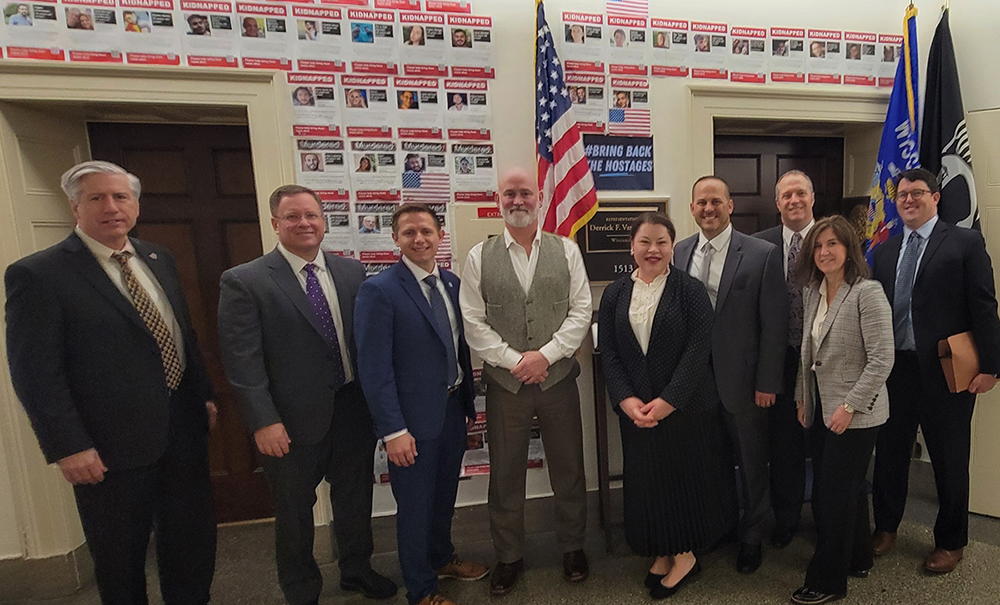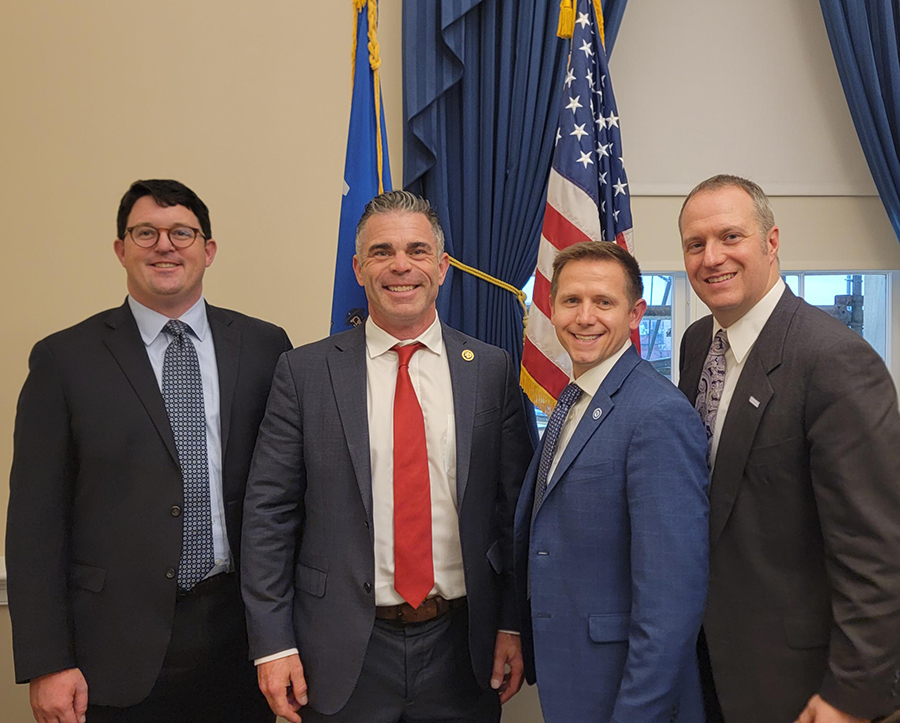WHA was back in Washington, DC with leaders from Wisconsin hospitals and health systems Dec. 10-11 to urge Wisconsin's Congressional Delegation to make sure Congress acts to
extend health care provisions that are scheduled to expire after Dec. 31, 2024:
- Telehealth waivers - Prior to the COVID-19 pandemic, Medicare did not reimburse for telehealth delivered to a patient's home. The patient was required to be seen at a health care facility, and even then Medicare would only reimburse if that facility was in a rural, health professional shortage area. Without an extension of these waivers, Medicare would revert to that policy.
- Hospital at Home - CMS authorized the Acute Hospital Care at Home program to expand access to care during the COVID-19 pandemic. The program allows people with low acuity conditions to receive a hospital level of care equivalent to an inpatient stay in the comfort of their own home along with daily visits by nurses and telehealth visits from physicians. It has been an important tool for hospitals to increase capacity given the continued challenges of finding post-acute care placements which are continuing to create bottlenecks in the health care system.
- Medicare-Dependent (MDH) and Low-Volume Adjustment Hospitals (LVH) - Wisconsin has approximately 16 "tweener" hospitals that are too large to be considered critical access hospitals but also too small to have the volumes necessary to offset Medicare and Medicaid losses. These MDH and LVH hospitals receive slightly enhanced Medicare reimbursement rates to help offset their Medicare losses. Losing these programs would amount to nearly $230 million in cuts to these hospitals over the next ten years.
 WHA and members with Rep. Derrick Van Orden
WHA and members with Rep. Derrick Van Orden
Joining meetings with members of Wisconsin's Congressional Delegation were:
- Michael Anderson, MD, President/CEO, Fort HealthCare
- Jim Nelson, SVP/CFO, Fort HealthCare
- Bob Van Meeteren, President/CEO, Reedsburg Area Medical Center
- Laura Kloss, Clinical Operations Director for Hospital at Home, Emplify Health
- Cynthia Lasecki, MD, Chief Medical Officer, Bellin Region, Emplify Health
- Nathan Franklin, Vice President of External Affairs & Sustainability, Emplify Health
- Carina Márquez-Oberhoffner, Senior Consultant External Affairs, Emplify Health
- Jeremy Levin, Director of Advocacy, Rural Wisconsin Health Cooperative
- Lindsay Punzenberger, Director of Federal Government Relations, Children's Wisconsin
- Molly Haase, Director of Advocacy, Marketing & Strategic Engagement, AdventHealth
- Brad Wolters, Director of Federal Government Relations, Marshfield Clinic Health System
- Maureen McNally, Vice President Governance and Government Relations, Froedtert Thedacare Health
- Jon Hoelter, Vice President of Federal and State Relations, WHA.
 WHA and members with Rep. Tony Wied
WHA and members with Rep. Tony Wied
While there have been recent reports in the media that Republicans and Democrats had been discussing a potential health care package with longer extensions to these important health care programs attached to a continuing resolution (CR) to fund the government, most members of Wisconsin's Congressional Delegation said they are only expecting Congress to include those provisions in a CR that goes through mid-March of 2025.
WHA highlighted the importance of Congress rejecting any proposed cuts to hospitals, such as site-neutral payments, to help pay for these programs, especially considering the challenging financial environment for hospitals, where 1/3 of Wisconsin hospitals experienced negative margins in 2023, and around half experienced lower margins in 2023 compared to 2022.
WHA also continued to urge support for legislation that would resolve the issue of drug companies denying
340B discounts at community contract pharmacies and PBMs pocketing the 340B savings intended for safety-net health care providers. Given that the
draft senate legislation introduced by the gang of six bipartisan senators (including new Senate Majority Leader John Thune and Wisconsin Senator Tammy Baldwin) has not yet been officially introduced, it seems likely that legislation will need to be worked on in the upcoming session of Congress.
Lastly, WHA members pushed for Wisconsin's Congressional Delegation to support legislation that would help
streamline the prior authorization process in Medicare Advantage. The
Improving Seniors Timely Access to Care Act of 2024 would help establish standardized electronic prior authorization for Medicare Advantage plans while also increasing transparency around health insurer MA denials and has been cosponsored by 229 Representatives in the House, including Reps. Pocan, Moore, and Grothman, and 59 members of the Senate, including Wisconsin Senator Tammy Baldwin. WHA urged Wisconsin's Congressional Delegation members to push for their leadership to have this legislation scheduled for a vote before the session ends.
Contact WHA Vice President of Federal and State Relations
Jon Hoelter with questions.